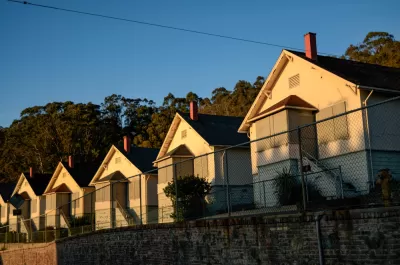As community land trusts take root and expand, they face numerous questions on how to stay communally-focused while their geographic scope grows.

"Community control" has as many meanings as "scale"—and as many meanings as "community." The baseline under it all is that properties have been permanently removed from the speculative market with their use to be determined for the good of a community, rather than for profit.
But that simple definition would also encompass publicly owned land and all nonprofit-owned land (not subject to Low Income Housing Tax Credit investor control). Typically, the intention of a CLT is for community control to go deeper than changing the name on the deed, aiming for something more like democratic control within their organization.
A classic CLT is a membership organization with members drawn from its service area. One-third of the board are CLT residents, elected by other CLT residents; one-third are community residents, elected by the members; with the remaining one-third being public representatives of other stakeholders, whether elected officials or professionals who support the mission. This is what makes a CLT different from a standard housing nonprofit, which may have a resident on the board, but rarely a majority, says Zach Murray, a CLT consultant who formerly worked for Grounded Solutions Network and the Oakland Community Land Trust (Oak CLT) in Oakland, California. "The democracy component is what separates the CLT from a traditional CDC, or even a housing authority," Murray says.
We’re creating space in the leadership of an organization for residents and for community members …. In housing, it’s really important that folks have a say in the communities that they live in. It’s different than just having a resident council or resident adviser group, actually having folks at the table to know the full extent of the operations of the organization.
When a CLT grows, the "community" in question can become more difficult to define. But to some extent it always was.
FULL STORY: Keeping Community Control as Community Land Trusts Grow

Planetizen Federal Action Tracker
A weekly monitor of how Trump’s orders and actions are impacting planners and planning in America.

Congressman Proposes Bill to Rename DC Metro “Trump Train”
The Make Autorail Great Again Act would withhold federal funding to the system until the Washington Metropolitan Area Transit Authority (WMATA), rebrands as the Washington Metropolitan Authority for Greater Access (WMAGA).

The Simple Legislative Tool Transforming Vacant Downtowns
In California, Michigan and Georgia, an easy win is bringing dollars — and delight — back to city centers.

The States Losing Rural Delivery Rooms at an Alarming Pace
In some states, as few as 9% of rural hospitals still deliver babies. As a result, rising pre-term births, no adequate pre-term care and "harrowing" close calls are a growing reality.

The Small South Asian Republic Going all in on EVs
Thanks to one simple policy change less than five years ago, 65% of new cars in this Himalayan country are now electric.

DC Backpedals on Bike Lane Protection, Swaps Barriers for Paint
Citing aesthetic concerns, the city is removing the concrete barriers and flexposts that once separated Arizona Avenue cyclists from motor vehicles.
Urban Design for Planners 1: Software Tools
This six-course series explores essential urban design concepts using open source software and equips planners with the tools they need to participate fully in the urban design process.
Planning for Universal Design
Learn the tools for implementing Universal Design in planning regulations.
Smith Gee Studio
City of Charlotte
City of Camden Redevelopment Agency
City of Astoria
Transportation Research & Education Center (TREC) at Portland State University
US High Speed Rail Association
City of Camden Redevelopment Agency
Municipality of Princeton (NJ)




























